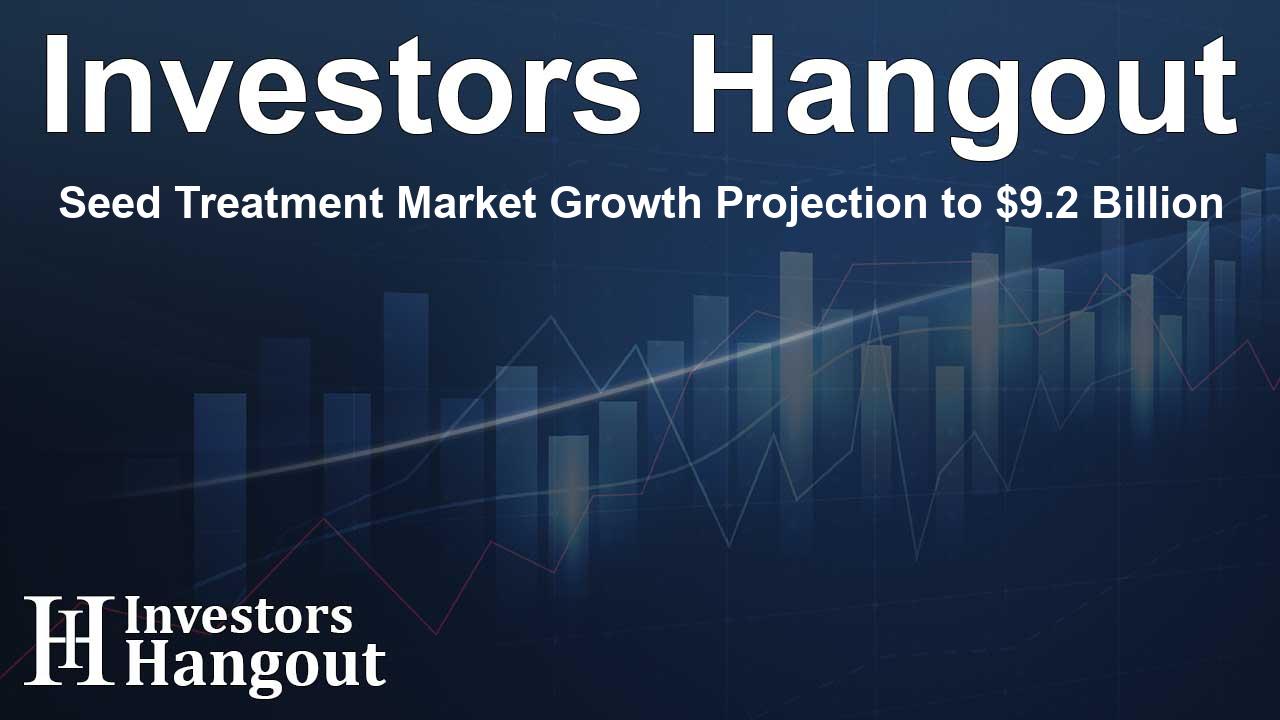Seed Treatment Market Growth Projection to $9.2 Billion

Growth of the Seed Treatment Market
The global seed treatment market is experiencing significant growth, projected to increase from $6.1 billion in 2022 to an impressive $9.2 billion by 2027. This remarkable expansion is anticipated due to a robust compound annual growth rate (CAGR) of 8.3%. Several driving factors contribute to this surge, including the escalating need for food security worldwide, rapid technological advancements in agriculture, the adoption of precision farming techniques, and support from various governments.
Essence of Seed Treatment in Modern Agriculture
Seed treatment has evolved into an essential practice for safeguarding crops against pests and diseases while enhancing germination rates. These advanced methodologies have become vital in modern agricultural practices, assisting farmers in achieving higher productivity and sustainability. With these treatments, growers are learning how to optimize their crop yields effectively, making seed treatments indispensable in contemporary farming.
Rising Popularity of Seed Coating
One key factor propelling the growth of the seed treatment market is the escalating demand for seed coating, especially within the commercial agriculture sector. As agricultural practices shift from traditional methods to modern, efficient techniques, farmers are investing in advanced seed options, leading to heightened yields and maximized profitability. Seed coating not only enhances the characteristics of seeds for improved compatibility with sowing methods but also significantly benefits high-value crops such as fruits, vegetables, and ornamental plants.
Innovative Companies Leading the Way
Industry leaders like BASF SE and Germains Seed Technology are at the forefront, pioneering innovations in seed coating technologies. Their advancements are helping to meet the changing needs of farmers and the market by providing solutions that enhance seed quality and crop performance.
Asia Pacific Region: A Hub for Seed Treatment Growth
The Asia Pacific region is on track to become a major player in the seed treatment market, expected to showcase the fastest growth during the forecast period. Countries such as China and Japan benefit from vibrant agricultural sectors coupled with favorable regulatory frameworks. China, in particular, is projected to dominate market share in the region, drawing substantial global investments to satisfy its local agricultural demands.
Oilseeds Driving Sector Growth
Among the various crop types, the oilseeds segment—which includes soybean, cotton, canola, and sunflower—is poised for substantial growth within the seed treatment industry. The versatility of these crops makes them a popular choice among farmers. The rising demand for canola and its appeal as an economical alternative to soybean are noteworthy, as well as the recognition of safflower oil for its functional health benefits.
Efficient Application Techniques: Seed Dressing
Seed dressing has emerged as the leading technique for applying seed treatments, expected to grow significantly in popularity. This method, either applied in dry forms or slurries, has found common use in the Asia Pacific region due to its cost-effectiveness and the adoption of natural alternatives such as neem leaves and aloe vera sap. This not only sustains local agricultural traditions but also aligns with a more eco-friendly approach to farming.
Prominent Seed Treatment Companies
The landscape of significant players in the seed treatment sector features key companies such as Syngenta, Corteva Agriscience, FMC Corporation, and Bayer AG. These leading entities are actively enhancing their market foothold through mergers, acquisitions, and strategic alliances, ensuring their innovations lead the charge in sustainable agricultural practices.
Looking Ahead: The Future of Seed Treatment
As we look toward the future of agriculture, the seed treatment market holds immense potential in equipping farmers with the necessary tools to enhance productivity and protect crop yields amid growing resource constraints. With increasing awareness and application of seed treatments, the agricultural sector is expected to evolve into a more sustainable model, fostering a healthier ecosystem for crops.
Frequently Asked Questions
How is the seed treatment market evolving?
The market is evolving through technology advancements and increasing adoption of innovative agricultural practices, contributing to its robust growth.
What are the main drivers of the seed treatment market?
Key drivers include rising food security demands, technological innovations in farming, and an increasing shift towards precision agriculture.
Why is seed treatment important in modern farming?
Seed treatment is crucial for enhancing crop resilience and improving yields, which are essential for meeting global food demands.
Which regions are leading the growth of the seed treatment market?
The Asia Pacific region is expected to lead due to its strong agricultural sector and favorable regulatory support.
What role do agricultural companies play in the seed treatment market?
They play a significant role by innovating and developing effective seed treatment solutions, securing market presence through collaboration and strategic partnerships.
About Investors Hangout
Investors Hangout is a leading online stock forum for financial discussion and learning, offering a wide range of free tools and resources. It draws in traders of all levels, who exchange market knowledge, investigate trading tactics, and keep an eye on industry developments in real time. Featuring financial articles, stock message boards, quotes, charts, company profiles, and live news updates. Through cooperative learning and a wealth of informational resources, it helps users from novices creating their first portfolios to experts honing their techniques. Join Investors Hangout today: https://investorshangout.com/
Disclaimer: The content of this article is solely for general informational purposes only; it does not represent legal, financial, or investment advice. Investors Hangout does not offer financial advice; the author is not a licensed financial advisor. Consult a qualified advisor before making any financial or investment decisions based on this article. The author's interpretation of publicly available data shapes the opinions presented here; as a result, they should not be taken as advice to purchase, sell, or hold any securities mentioned or any other investments. The author does not guarantee the accuracy, completeness, or timeliness of any material, providing it "as is." Information and market conditions may change; past performance is not indicative of future outcomes. If any of the material offered here is inaccurate, please contact us for corrections.